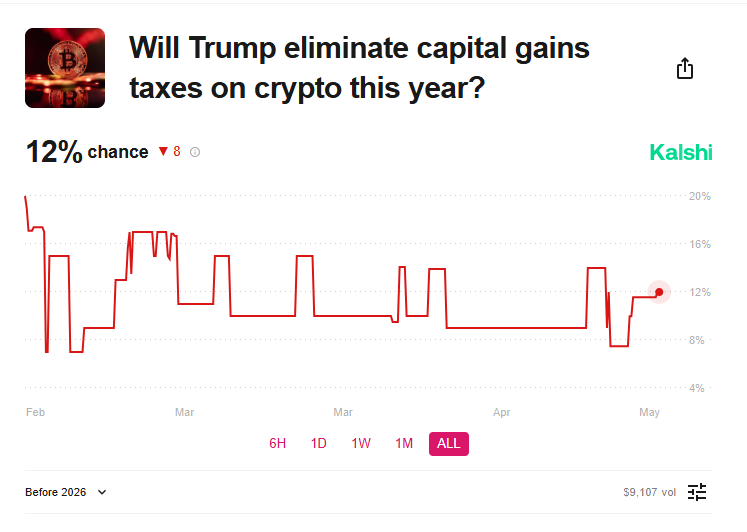TLDR
- Senators Lummis (R-WY) and Moreno (R-OH) urged Treasury to exempt unrealized crypto gains from Biden-era Corporate Alternative Minimum Tax (CAMT)
- The combination of CAMT and FASB’s new accounting rules could force companies to pay taxes on digital assets they haven’t sold
- Lawmakers warn this policy puts US crypto firms at competitive disadvantage against foreign competitors
- The senators’ action follows other pro-crypto moves under Trump, including repeal of IRS’s DeFi broker rule
- Missouri is considering eliminating all capital gains taxes, including on crypto assets
US Senators Cynthia Lummis and Bernie Moreno have called on the Treasury Department to reconsider a tax policy that could force crypto companies to pay taxes on profits they haven’t realized. In a letter sent Tuesday to Treasury Secretary Scott Bessent, the Republican lawmakers warned that the current application of the Corporate Alternative Minimum Tax (CAMT) to digital assets puts American firms at a disadvantage.
Our edge in digital finance is at risk if U.S. companies are taxed more than foreign competitors. @berniemoreno & I urged the @USTreasury to lift an unintended tax burden on U.S. digital asset companies. To lead the world in digital assets, we need a level playing field.⬇️ pic.twitter.com/V7pwAUqRc4
— Senator Cynthia Lummis (@SenLummis) May 13, 2025
The senators expressed concern that the convergence of tax law and updated accounting rules “undermines fairness, distorts markets, and penalizes US companies for adopting innovative financial strategies.” Lummis shared the letter on X, stating that “Our edge in digital finance is at risk if US companies are taxed more than foreign competitors.”
At issue is the CAMT, enacted under the Biden administration’s Inflation Reduction Act. The tax applies a 15% minimum tax on a company’s “adjusted financial statement income” for firms averaging $1 billion or more in annual earnings.
The Accounting Rule Change
The problem emerged when the Financial Accounting Standards Board (FASB) issued a new rule in December 2023. This rule requires companies to value digital assets using fair-value accounting, also known as mark-to-market accounting.
This accounting change was initially welcomed by the crypto industry for improving transparency. However, it created an unintended tax consequence when combined with CAMT.
Under the new FASB rule, companies must report the current market value of their crypto holdings on financial statements. For CAMT purposes, this means unrealized gains on digital assets could trigger tax liability even when the assets haven’t been sold.
“Neither Congress nor FASB planned this outcome,” the senators wrote in their letter. “It’s the unintended result of basing tax liability on decisions by a private organization… not principles of taxation.”
The lawmakers warned that the current policy could force firms to liquidate crypto assets just to meet tax obligations. They noted that foreign companies, which follow different accounting standards, would not face the same burden.
This creates what the senators described as a widening competitive gap between US firms and their international counterparts. They urged Treasury to “act swiftly” to provide clarity on the issue.
Pro-Crypto Movement in Washington
The senators’ call for action is part of a broader shift in Washington’s approach to cryptocurrency regulation under President Donald Trump. Since taking office, the Trump administration has worked to reverse several Biden-era crypto regulations.

In March, the Senate passed a resolution to overturn the IRS’s “DeFi broker rule.” This rule would have required decentralized finance protocols to report user activity similar to traditional financial intermediaries.
The DeFi broker rule, finalized during President Biden’s final weeks in office, faced heavy criticism from industry groups. They argued it was unworkable and too invasive.
In April, President Trump signed the resolution into law. This marked the first crypto-related legislation enacted by any US president.
Senator Lummis has emerged as a key legislative figure in the crypto space. She previously worked on bipartisan efforts like the 2022 Lummis-Gillibrand Responsible Financial Innovation Act, which proposed a comprehensive regulatory framework for digital assets.
Though that bill stalled, it established groundwork for much of today’s congressional momentum around crypto legislation. In March, Lummis reintroduced the BITCOIN Act, which would create a national Bitcoin reserve.
The latest push by Lummis and Moreno asks Treasury to exclude unrealized crypto gains from tax calculations. They suggest this could be done either across the board or specifically for gains triggered by the new accounting rule.
Missouri may soon take an even more dramatic step regarding crypto taxation. The state has passed House Bill 594, which would eliminate state capital gains tax on all asset classes, including cryptocurrencies. The bill awaits the governor’s signature.
If signed, Missouri would become the first state to remove capital gains tax on all asset classes, including Bitcoin and other digital assets.






